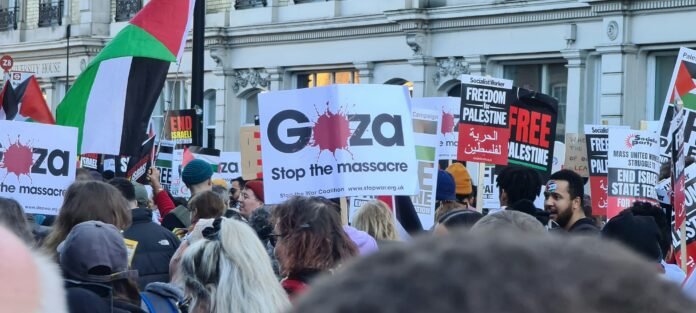Understanding the Crisis in Gaza
The Gaza Strip is currently grappling with a severe famine crisis, which has escalated to alarming levels, as outlined by the latest Integrated Food Security Phase Classification (IPC) analysis. Over half a million people in this densely populated region are facing acute food insecurity, a situation exacerbated by ongoing conflict, economic decline, and restrictive measures affecting the flow of goods and humanitarian aid. The famine conditions have led to widespread malnutrition, with vulnerable groups, including children and the elderly, particularly at risk of starvation and related health complications.
This crisis did not emerge overnight; it is deeply rooted in a complex historical context marked by a prolonged blockade that has severely restricted the movement of people and goods in and out of Gaza since 2007. The blockade has incapacitated the local economy, leading to high unemployment rates and limited purchasing power. Consequently, residents struggle to access not only food but also essential services such as healthcare, education, and clean water. The destruction of vital civilian infrastructure, including power plants, hospitals, and schools, further compounds the humanitarian implications of the blockade and ongoing violence.
Furthermore, military operations and recurrent escalations have devastated agricultural lands and fishing zones, which are crucial for food production in Gaza. As a result, reliance on imported food has increased, making the population vulnerable to global market fluctuations and escalating prices. Food items have become unaffordable for many, forcing families into increasingly desperate situations. The conditions in Gaza remain dire, leading to a growing concern among international humanitarian organizations regarding the rising potential for death and destitution among the population.
The Humanitarian Impact on the Palestinian People
The ongoing famine crisis in Gaza significantly exacerbates the humanitarian situation, especially among the most vulnerable populations, including children. Reports indicate that malnutrition has reached alarming levels, with approximately 2 million people, half of whom are children, facing food insecurity due to the prolonged blockade and conflict. UNICEF has reported that nearly 500,000 children in Gaza are suffering from acute malnutrition, highlighting the dire need for therapeutic food and urgent intervention.
These health crises are compounded by a severe lack of medical supplies. Essential medication, which is crucial for treating various preventable diseases such as pneumonia and diarrhea, has dwindled to alarming levels. As a result, thousands of children are left without the necessary care they need to recover, leading to a relentless cycle of preventable deaths. The World Health Organization estimates that the rates of such diseases have risen by over 30% since the onset of the famine, demonstrating a direct correlation between starvation and health deterioration among the population.
The impact of famine also extends to mental health, with reports of increased anxiety and depression among families struggling to provide basic needs for their children. The trauma associated with both food scarcity and the constant threat of violence places an additional burden on the already fragile mental wellbeing of these individuals. As a consequence, the psycho-social fabric of Palestinian society is deteriorating, leading to further long-term repercussions on their development and resilience.
In light of these overwhelming statistics and heartbreaking stories, there is an urgent need for immediate humanitarian assistance. The international community must prioritize the provision of therapeutic food, medical supplies, and mental health support to mitigate the effects of the ongoing famine and to alleviate the suffering of the Palestinian people.
International Response and Legal Obligations
The Gaza famine crisis has drawn urgent attention from the international community, emphasizing both legal and moral responsibilities to intervene. International humanitarian law, particularly the Geneva Conventions, establishes clear obligations regarding the protection of civilians amidst armed conflicts. These legal frameworks highlight the necessity for states and international organizations to act decisively when humanitarian crises arise, to ensure the safety and well-being of affected populations.
Calls for an immediate ceasefire have intensified, with numerous nations and coalitions advocating for a halt to hostilities to facilitate humanitarian access. The principle of proportionality and distinction in conflict must be reinforced, mandating all parties to distinguish between combatants and non-combatants. As the famine continues to exacerbate conditions on the ground, enabling unimpeded humanitarian access becomes critical. The international community is thus urged to intervene and create corridors for delivering food, medical supplies, and other essential resources to the Palestinian population suffering from the adverse effects of the ongoing conflict.
Moreover, accountability remains a crucial component in addressing both the famine crisis and the broader humanitarian situation in Gaza. States must ensure that those responsible for obstructing aid and intentionally targeting civilians face international scrutiny. Mechanisms for accountability, including investigations into violations of international law, must be established to uphold the rights of those affected by the crisis. It is vital for the international community to not only respond to immediate needs but also to support long-term solutions that address the root causes of the humanitarian crisis.
Action is paramount; the failure to intervene reflects poorly on global commitment to uphold human rights and protect vulnerable populations. The continued plight of the Palestinians requires the unwavering dedication of the international community to fulfill their legal obligations and moral duties during this alarming crisis.
A Call to Action: What Can be Done?
The Gaza famine crisis presents a dire humanitarian situation that calls for immediate and collective action from individuals and organizations around the world. To effectively alleviate the suffering faced by the Palestinian people, it is essential for all of us to engage in advocacy for humanitarian aid. Support for initiatives aimed at delivering food, nutrition, and medical assistance can substantially improve the lives of those affected. Individuals can begin by contacting their local representatives to urge governments to support international aid efforts and maintain diplomatic pressure for the resolution of this crisis.
Raising awareness is another critical component of action. Social media platforms provide a powerful avenue for disseminating information on the ongoing humanitarian crisis in Gaza. By sharing verified facts, personal stories, and calls to action, individuals can mobilize their communities and broaden the conversation around the issues faced in the region. Encouraging friends, family, and colleagues to engage in discussions about the Gaza famine can help ensure that this urgent crisis remains in the public eye.
Partnerships with non-governmental organizations (NGOs) that are focused on providing aid to Gaza are also vital. Individuals can contribute through donations, volunteer efforts, or by helping to organize community fundraisers. Many organizations offer structured programs through which people can engage directly in relief efforts, whether through financial support or by physically participating in advocacy events. Further, signing petitions that demand accountability and justice for the Palestinian people can amplify collective voices calling for change.
By taking these actionable steps, individuals and groups can play a pivotal role in addressing the devastating effects of the Gaza famine crisis. It is imperative that everyone recognizes their potential impact and contributes to efforts that promote humanitarian assistance, justice, and lasting solutions for the people in Gaza.


